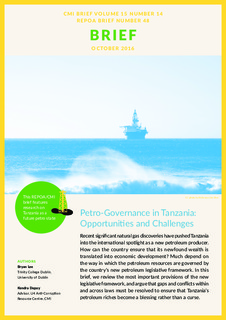| dc.description.abstract | Recent significant natural gas discoveries have pushed Tanzania into the international spotlight as a new petroleum producer. How can the country ensure that its newfound wealth is translated into economic development? Much depend on the way in which the petroleum resources are governed by the country’s new petroleum legislative framework. In this brief, we review the most important provisions of the new legislative framework, and argue that gaps and conflicts within and across laws must be resolved to ensure that Tanzania’s petroleum riches become a blessing rather than a curse.
Authors
Bryan Lee Trinity College Dublin, University of Dublin
Kendra Dupuy Advisor, U4 Anti-Corruption Resource Centre, CMI
Institutional Quality and the Resource Curse
On average, countries that are rich in high-value natural resources such as oil and gas are more likely to suffer the effects of the so-called “resource curse”: violent conflict, poverty, and non-democratic government. Recent research emphasizes that good institutions are required for preventing these outcomes. The key institutions in question include the extent of the rule of law, bureaucratic quality, level of government corruption, and the risk of investment expropriation and contract repudiation. Strong institutions are important because they create incentives for government officials to use resource revenues to ensure the welfare of citizens and constrain them from engaging in harmful rent-seeking behavior and expropriation.
The legal framework represents the most basic and fundamental of institutions for managing natural resources. Legal regulations establish the government’s authority over the resources on its territory, determine the rules for how those resources will be extracted and produced, and say who can reap benefits from resource use and who must bear and mitigate the costs. They also establish the bureaucratic agencies that are responsible for impl | |
